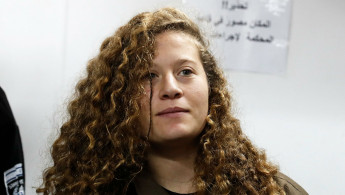Singapore bans 'skewed, inflammatory' Palestinian film about Ahed Tamimi
Ahed Tamimi was arrested last month for "humiliating" an Israeli officer after a video went viral on social media platforms of her slapping a soldier who shot her cousin.
The city-state's media regulator, IMDA, said on Thursday the film Radiance of Resistance was "skewed" and potentially divisive for Singapore's multi-ethnic population.
The banned documentary, which looks at the Palestine-Israel conflict through the eyes of Tamimi and another girl, lacked "counterbalance," said IMDA on its website.
"The skewed narrative of the film is inflammatory and has the potential to cause disharmony among the different races and religions in Singapore."
In it, Tamimi and the other girl are presented as the new faces of Palestinian resistance to the Israeli military occupation.
"In holding up the girls as role models to be emulated in an ongoing conflict, the film incites activists to continue their resistance against the alleged oppressors," IMDA added.
While most of Singapore's inhabitants are ethnic Chinese, there is a significant Muslim minority. Singapore has strict laws against anything seen as provoking disharmony.
Ahed's arrest
In Israel, the soldiers' decision not to react to the seeming provocation by Ahed Tamimi on December 15, has stirred a debate about deterrence and drawn allegations that the army was humiliated.
Three days after the confrontation, amid an uproar in Israel, Tamimi was arrested from her home in a pre-dawn raid.
She was led in leg shackles to an Israeli military courtroom where a judge reserved a decision on whether to keep her without bail.
 |
In holding up the girls as role models to be emulated in an ongoing conflict, the film incites activists to continue their resistance against the alleged oppressors |  |
Nabi Saleh, a village of about 600 people, were protesting US President Trump's decision. The Israeli military claimed the protest turned violent, with about 200 Palestinians throwing stones at soldiers. Several people entered a local house, with the consent of the owners, and continued to throw stones.
The army added that soldiers entered the house and removed the protesters, remaining by the entrance to prevent others from entering. At that point, several Palestinians emerged from the house and began to "violently provoke the soldiers," the army said.
Bassem Tamimi, Ahed's father, said that minutes earlier, soldiers had fired a rubber bullet from close range at 15-year-old Mohammed Tamimi, a cousin of Ahed and a frequent guest in the Tamimi home.
After surgeons removed the bullet that had entered from his mouth and lodged in his brain, the teenager was placed in intensive care said officials at Ramallah's Istishari Hospital.
The video shows Ahed Tamimi and a young woman walking toward the two soldiers. Tamimi tells the soldiers to leave. She pushes and kicks them, and then slaps one of them.
Israeli authorities are now seeking 12 charges against Ahed Tamimi, and she faces up to 14 years in prison.
Praise and anger
Israeli social media users reacted in anger to the video of Ahed confronting the soldiers. Naftali Bennett, the right wing Israeli education minister said, "these girls should be imprisoned and locked up for life"
The Israeli army also pitched in, saying that it had been a mistake to not arrest her "immediately" as she "tried to block the soldiers' mission".
The sharply conflicting Palestinian and Israeli interpretations of the widely viewed video clip highlight the deep rift between the two societies, at a time of heightened tension over the status of contested Jerusalem, the centrepiece of the long-running conflict.
Trump broke with decades of US policy earlier this month by recognising Jerusalem as Israel's capital and declaring he would move the country's embassy from Tel Aviv to the contested city.
Jerusalem is a key issue in the Israeli-Palestinian conflict and the move has caused widespread anger in the region and garnered international condemnation.
Ahed has made headlines in the past, including in 2015 when she bit the hand of a masked Israeli soldier who was holding her now 14-year-old brother Mohammed in a chokehold during an attempted arrest.
 |
Ahed has made headlines in the past, including in 2015 when she bit the hand of a masked Israeli soldier who was holding her now 14-year-old brother Mohammed in a chokehold during an attempted arrest |  |
Detention of minors
The detention of Tamimi also highlighted the issue of arrests of Palestinian minors.
Defense for Children International-Palestine, a local group, said 331 Palestinians under the age of 18 were held in military detention as of May, according to the most recent statistics released by Israeli authorities. It said that in 2016, an average of 375 minors were in detention each month.
The Israeli military was unable to provide data on the number of minors it is holding.
Twitter Post
|
It said, however, that "unfortunately, in recent years, many minors, sometimes very young, have been involved in violent incidents, incitement and even terrorism. In such cases, there is no choice but to take steps, including arrest, interrogation and prosecution." It said the military does everything possible to "ensure that the rights of the minors are respected."



